Conferences and Workshops

Biosensors for Pandemics 2021: an ICN2 Severo Ochoa Workshop
February 2021, online
The first ICN2 Severo Ochoa Workshop on Health, titled "Biosensors for Pandemics 2021: Reliable and efficient nanotech-based diagnostics in emergency situations", was celebrated virtually on February 2-3. It was the second edition of an online conference launched in 2020 to discuss possible applications of biosensing technologies to the diagnostic of COVID-19 and other possible future viral diseases. Experts in biosensors who were working to address the issues raised by the COVID-19 pandemic, as well as specialists in virology, epidemiology and other related fields, met to discuss their ideas and research projects.
The event was organised by the ICN2 and the Phantom Foundation (Spain), with sponsorship by ICREA. ICREA Prof. Arben Merkoçi, leader of the ICN2 Nanobioelectronics and Biosensors Group, and Prof. Laura Lechuga, leader of the ICN2 Nanobiosensors and Bioanalytical Applications group were respectively Scientific Chairperson and Co-chairperson of the conference. ICREA Prof. Stephan Roche, leader of the ICN2 Theoretical and Computational Nanoscience group, collaborated to the organisation as a member of the Scientific Committee.

"Clustering and Global Challenges” (CGC2021) international online conference
April 2021, online
The Barcelona-Grenoble-Tsukuba “Clustering and Global Challenges” (CGC2021) international online conference was held on 7-9 April. A packed programme of talks, with parallel thematic sessions, allowed discussing the most recent research advances and technology developments in many hot sectors, such as Quantum Technologies, Advanced Materials, Health, Smart Energy and Topological/Photonic Materials.
This online event was organized by the ICN2, the International Center for Materials Nanoarchitectonics of the Japanese National Institute for Materials Science (MANA/NIMS) and the Laboratoire d’Alliances Nanosciences-Energies du Futur of Grenoble (LANEF). It gathered experts in the aforementioned strategic technological fields, to discuss about the main challenges and opportunities in them, many of which can be addressed globally, by crating synergies between institutes and clustering at the international level.
The ICN2 participated very actively, not only being one of the organizing institutes, but also contributing many oral presentations by group leaders and researchers. Among the speakers were: ICREA Prof. José Antonio Garrido, Dr José Santiso, Dr Klaas-Jan Tielrooij, Dr Aitor Mugarza, Dr. Maria Soler, Dr. Mónica Lira Cantú, Maria Tenorio, ICREA Prof. Victor Puntes, ICREA Prof. Arben Merkoçi, ICREA Prof. Stephan Roche and ICREA Prof. Sergio Valenzuela.
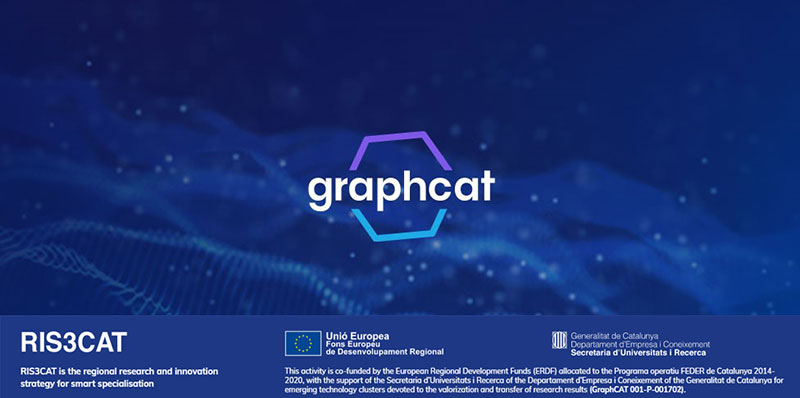
GraphCAT community event
April 2021, online
The GraphCAT community met for the first time on the 8 and 15 April 2021. The meetings combined sessions exclusive to members of the community with sessions open to people or entities interested in innovative projects, being developed in Catalonia, related to graphene technology.
As part of the Intelligent Specialization Strategy of the Generalitat de Catalunya, RIS3CAT, and funded through FEDER Funds, GraphCAT was created to promote the transfer of technology and to strengthen the local ecosystem of emerging high potential sectors, such as the network of graphene technologies. The GraphCAT hub was formed by ICN2, ICFO, IFAE, BIST, IREC, IDIBAPS, IMIM, IMB-CNM, Eurecat and UAB. Associate members and collaborators were the research centres ICIQ and IBEC, the Fundació Barraquer, the companies Earthdas and Graphenica, the deep tech cluster Secpho and other collaborating companies including Keysight Technologies, INBRAIN Neuroelectronics, QURV Technologies, and Sorigué.
In these two appointments, future projects related to graphene that GraphCAT promoted were be discussed. In particular, the progress was presented of ten projects in four different areas: medical devices (especially neural interfaces and implants); new integrated circuits incorporating graphene into CMOS technology for optoelectronic applications (spectrometry, cameras, etc.); production of graphene and membranes; and, harvesting and storage of energy.
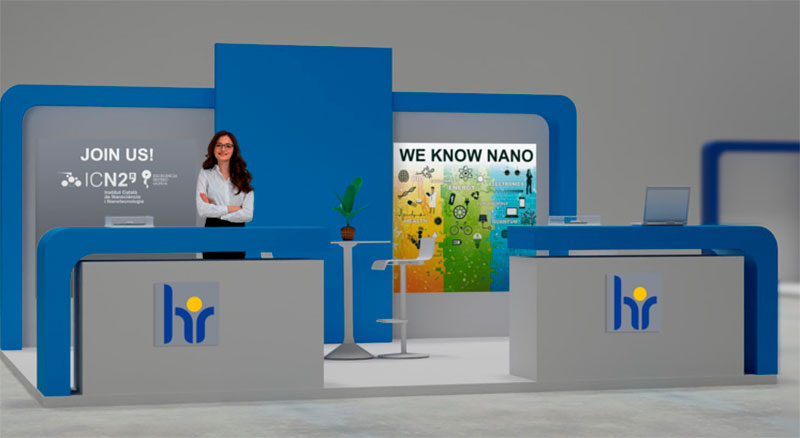
UB Companies Fair (Fira d’Empreses)
May 2021, online
Yet another year, the ICN2 participated as a sponsor in the Companies Fair (Fira d’Empreses) of the University of Barcelona (UB), held online on the 28th of April. The Company Fair is a chance for students to meet representatives from companies and institutions related to the studies they are pursuing. This contact between students and companies can lead to internship agreements, scholarships, or even work contracts.
This year, due to the COVID-19 pandemic, the Fair was held online. Students that attended the talk given by ICN2 members were interested in getting and internship or doing a PhD, amongst other offers. Speakers of the ICN2 could resolve doubts and encourage students to continue their path towards a career in science and the nanoworld.

Topological Matter Conference (TMC)
June 2021, online
From June 28 to July 1, the ICN2 hosted the 2021 Topological Matter Conference (TMC), organized within the framework of the H2020 FET-PROACTIVE projects TOCHA and SKYTOP with the objective to establish collaborations and create momentum in the community working in this field. The event, which is intended to becoming an annual appointment, focused on recent developments in fundamental and applied aspects of broad classes of topological quantum systems and the synergy between them. Among the topics covered were topological insulators and Weyl semimetals, topological phononics and photonics, skyrmions, quantum metrology and more.
It counted on the participation of various ICN2 senior researchers: Prof. Sergio O. Valenzuela, Physics and Engineering of Nanodevices Group Leader and coordinator of TOCHA, Prof. Stephan Roche, Theoretical and Computational Nanoscience Group Leader, Prof. Clivia M. Sotomayor Torres, Phononic and Photonic Nanostructures Group Leader, and Dr P. David García, Senior Researcher in Prof. Sotomayor Torres’ group.
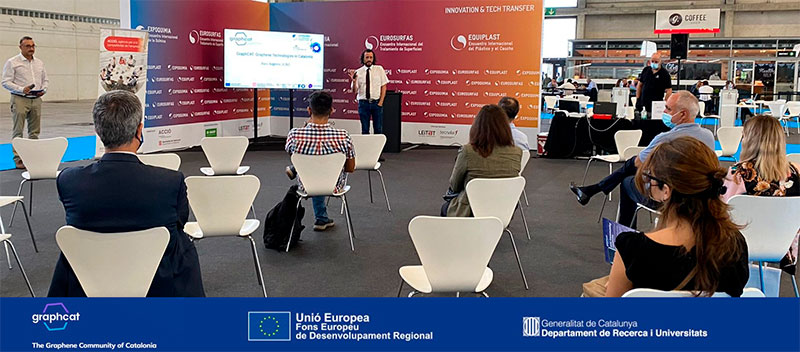
Expoquimia
September 2021, Barcelona
The 19th edition of Expoquimia, an international gathering of the chemistry industrial sector that takes place every three years in Barcelona, was held 14 at the Fira de L´Hospitalet de Llobregat (Barcelona). The event, which was combined with Equiplast and Eurosurfas, included a large showroom for exhibitors and a rich programme of conferences and workshops on topics spanning new technologies for sustainability and circular economy, new materials and smart surfaces, pharma-chemistry, automation and digitalization in chemistry industry, to mention a few.
The ICN2 took part in this event as a member of the GraphCAT Community, which has been created with the aim to bring together local and international experts in cutting-edge graphene technologies and establish Catalonia as an international reference in graphene research, development and innovation. Key to GraphCAT’s mission is facilitating the transfer of technology to industry. With this goal, it built a space within the Tech Transfer area of Expoquimia 2021, where visitors discovered more about some of the innovative material technologies developed by the members of the GraphCAT consortium and collaborations with industrial partners were established. Dr Claudia Nieva, Business Developer at the ICN2, Clara Barreneche, Head of Innovation & Business Development of BIST, Ylenia Almar, Project Manager of GraphCAT, Dr Virginia Greco and Àlex Argemí, from the ICN2 Marketing and Communication Department, and Dr Marta Sans, Project Manager for the Graphene Flagship at ICFO, greeted visitors at the GraphCAT meeting point. Àlex Árgemi, Head of Marketing and nCommunication at the ICN2, offered a talk etitled “GraphCAT: Graphene Technologies in Catalonia”.
This event was also a great stage to present the formation of Cooling Photonics, a new spin-off company springing from a research carried out at the ICN2, by the Phononic and Photonic Nanostructures Group, led by ICREA Prof. Clivia Sotomayor Torres. The technology put forward by the company, which was developed mainly by senior researcher Dr Juliana Jaramillo Fernández, provides passive cooling solutions without energy consumption or carbon emissions. Javier Achiaga, CEO of Cooling Photonics, Antonio Cuenca, COO, and Dr Juliana Jaramillo presented the company, the technology and its applications in a talk at Expoquimia 2021.

Trends in Nanotechnology International Conference (TNT2021)
October 2021, Albania
The 21st edition of Trends in Nanotechnology International Conference (TNT2021) was held on 4-8 October 2021 in Tirana (Albania). Since the first event (TNT2000), which took place in Toledo, Spain, this scientific meeting series has gathered over the years many experts in nanoscience and nanotechnology to discuss a broad range of research lines and projects, as well as related initiatives and policies (in particular at European level). The topics covered, across the various plenary and parallel sessions, span graphene and 2D materials, nanobiosensors and nanomedicine, nanomagnetism and spintronics, optics and photonics applications, nanomaterials for energy, nanofabrication tools, and many more.
This year’s edition was co-chaired by ICREA Prof. Arben Merkoçi, leader of the ICN2 Nanobioelectronics and Biosensors Group, and Antonio Correia, from the Phantoms Foundation --main organiser, together with NanoAlb-Academy of Sciences of Albania. The event was also supported by the Embassy of Spain in Tirana. Besides participating in the organisation of the event, the ICN2 was contributing many keynote and invited talks, posters and lectures. Among the keynote speakers are Prof. Pablo Ordejón, ICN2 Director and head of the Theory and Simulation Group, and various other group leaders –ICREA Prof. Jordi Arbiol, ICREA Prof. Aitor Mugarza, Dr Klaas-Jan Tielrooij and, Prof. Arben Merkoçi.
Since one of the main objectives of the TNT conference series is to provide a platform for young researchers to share their work and interact with high-level scientists, special sessions were dedicated to oral and poster presentations by PhD students. Prizes are also awarded to young researchers for the work they presented. This year, one of the prizes for best poster waas been granted to Massimo Urban, doctoral student in the ICN2 Nanobioelectronics and Biosensors Group.
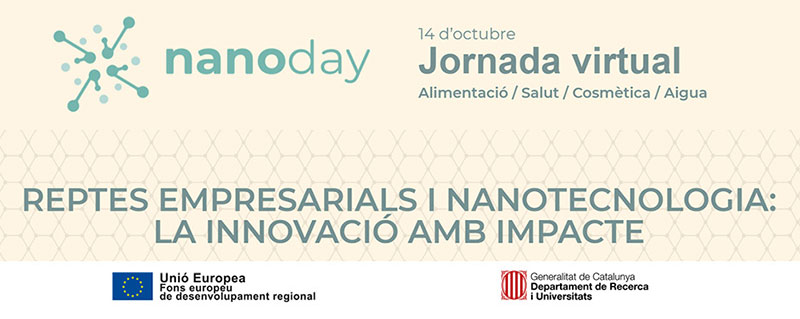
Nanoday conference
October 2021, online
The first Nanoday conference, dedicated to the development of nanotechnology in Catalonia and its impact on food, health, cosmetics and water, was held on October 14 in a virtual format. This initiative was co-organised by the Catalan Foundation for Research and Innovation, ACCIÓ –the Government of Catalonia's agency for business competitiveness— and the Barcelona Chamber of Commerce.
“Business challenges and nanotechnology: innovation with impact” was the headline of the event, which included a few talks and discussions about the state-of-the-art of nanotechnology in Catalonia, followed by four parallel thematic roundtables, one for each area of application mentioned above. The event was a great occasion to present the ACCIÓ Annual Report as well as the White Book of Nanotechnologies.
Àlex Argemí, Head of the ICN2 Marketing and Communication Department, chaired the roundtable on health, bringing the viewpoint of the GraphCAT community, an activity co-funded by the European Regional Development Funds (ERDF-FEDER). Among the speakers in this session was also Dr Carolina Aguilar, CEO of INBRAIN Electronics, an ICREA and ICN2’s spin-off company. Dr Maria José Esplandiu, CSIC tenured scientist working in the ICN2 Magnetic Nanostructures Group, participated in the roundtable about water, with a talk on nanomaterials for the (photo)-electrochemical degradation of water contaminants.
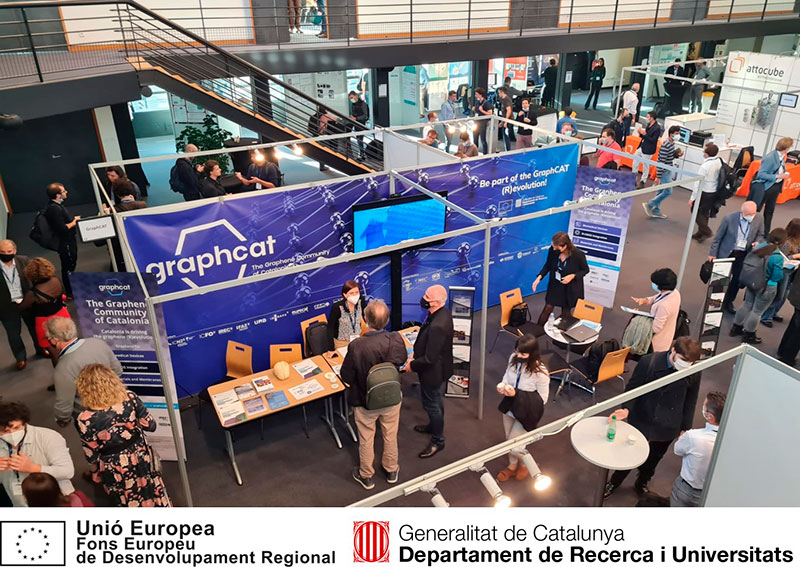
Graphene Conference
October 2021, France
The 11th edition of the Graphene Conference series, the largest European event in Graphene and 2D Materials, was held on 26-29 October in Grenoble (France). The event was organized by Phantom Foundation in collaboration with many research institutes and organisms –ICN2, ICREA, Technische Universität Dresden, Istituto Italiano di Tecnologia, UC Louvain, and AMO. Recent advances in 2D materials technologies were discussed across four days of plenary sessions, parallel workshops, an industrial forum, doctoral student presentations and a poster session. The event also includes an exhibition space for research institute and industries working on 2D materials and their applications.
The ICN2 was directly involved in the organization of the Conference, with ICREA Prof. Stephan Roche, leader of the Theoretical and Computational Nanoscience Group, as a member of the Organising Committee. ICREA Prof. Arben Merkoci, leader of the Nanobioelectronics and Biosensors Group, gave an invited talk at the Industrial Forum and many other ICN2 researchers are contributing presentations or posters.
Very relevant, this year, is the participation to the exhibition within the framework of the GraphCAT project, which was launched in 2019 by ten non-profit research institutes –ICN2, ICFO, IREC, IFAE, UAB, IDIBAPS, EURECAT, IMB-CNM, IMIM and BIST— with the aim to establish Catalonia as a hub of excellence in graphene technology research and development. At the stand held by GraphCAT, members of the ICN2 (Ylenia Almar, officer in the Competitive Funding Department and Project Manager of GraphCAT, Dr Virginia Greco and Àlex Argemí from the Marketing and Communication Department), the ICFO (Dr Marta Sans, Project Manager) and BIST (Clara Barreneche, Head of Innovation & Business Development) presented some of the graphene-based technologies developed by the GraphCAT consortium. GraphCAT sponsored a session of the conference dedicated to graphene technology development in Catalonia.
The event closed with a plenary session in which Dr Klaas-Jan Tielrooij, leader of the ICN2 Ultrafast Dynamics in Nanoscale Systems Group, talked about one of his recent works on graphene. With 450 participants in the 2021 edition, this conference has strengthened its position as a very relevant gathering for the Graphene Community worldwide.

Puzzle X
November 2021, Barcelona
PUZZLE X was an innovative event dedicated to frontier materials and their role in meeting the United Nations Sustainable Development Goals. Integrated in the largest Smart City Expo World Congress, PUZZLE X held a dedicated stage and an exhibition space for companies and research institutes to present their technologies and show prototypes. It took place at the Fira de Barcelona (in Hospitalet de Llobregat) from 16 to 18 of November 2021.
The aim of this event, organized by AMPT (Advanced Material Pandemic Taskforce) and supported by the Government of Spain, Generalitat de Catalunya and Ajuntament de Barcelona, was to provide a space for professionals of frontier materials and smart technologies to meet and create a bridge between different worlds: research, entrepreneurship, venture building, and corporate innovation. All this in a context in which societal impact, sustainability and a better future are central values and goals.
The ICN2 participated in this lively and exciting event with a booth devoted to the GRAPHCAT project, led by ICREA Prof. Jose A. Garrido, shared with the Barcelona Institute of Science and Technology (BIST), of which it is part. A roundtable discussion on Graphene in Catalonia was introduced and chaired by Prof. Garrido, who is also ICN2 Deputy Director, leader of the ICN2 Advanced Electronic Materials and Devices Group and CSO of INBRAIN Neuroelectronics, a spin-off company of ICREA and the ICN2. The other panellists of this discussion on applications of graphene in four key fields –biomedical devices, electronics, materials and membranes, and energy— were Dr Nina Carretero, from IREC, Dr Anibal Pacheco-Sanchez, from UAB, Prof. Pedro Gomez-Romero, leader of the ICN2 Novel Energy-Oriented Materials Group, and Josep Sanfeliu, from Asabys Partners. Later in the same morning, ICREA Prof. Arben Merkoçi, leader of the ICN2 Nanobioelectronics and Biosensors Group, gave a flash talk on nanotechnologies for diagnostics developed by his team.
The 20 sqm stand in the exhibition area was shared by various institutes members of BIST (ICN2, ICFO, IREC, IBEC) and three young companies which originated from research projects carried out at the ICN2: Cooling Photonics; FutureChromes; and GraphenicaLab. In this exhibition space, various members of the involved institutes and spin-off companies took turns to provide information and give a demonstration of the technologies on display to visitors and potential customers. The GraphCAT/BIST “crew” included Dr Virginia Greco, Àlex Argemí, and Joana Pi-Suñer from the ICN2 Marketing and Communication Department, Dr Pablo Pomposiello and Dr Claudia Nieva, from the ICN2 Business and Innovation Department, Ylenia Almar, officer in the ICN2 Competitive Funding Department and Project Manager of GraphCAT, and Dr Amador Pérez, from the ICN2 Advanced Electronic Materials and Devices.
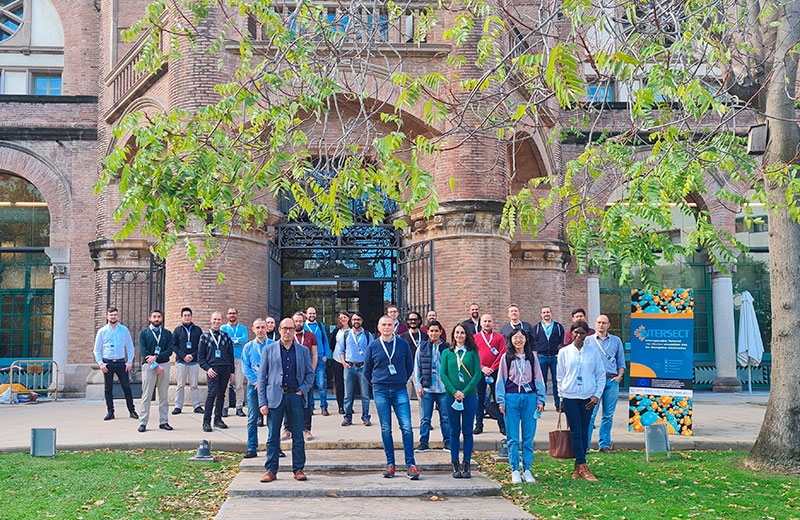
International Workshop on Advanced Materials-to-Device Solutions for Synaptic Electronics
November 2021, Barcelona
The International Workshop on Advanced Materials-to-Device Solutions for Synaptic Electronics, organised in the framework of the EU funded INTERSECT project, was held on 10-12 November 2021 at the Casa de Convalescencia in Barcelona. This event aimed to provide a platform for discussion to professionals from academia, research centres and industry working in the field of synaptic electronics and neuromorphic computing, with a specific focus on the role of materials in the design of next-generation devices for these applications.
The workshop, which was held in a hybrid format, was organised by the Nanoscience Institute of the Italian National Research Council (CNR Nano) and ICN2. Among the members of the Organising and the Scientific Committees were Prof. Pablo Ordejón, ICN2 Director and leader of the Theory and Simulation Group, and Dr Arrigo Calzolari, INTERSECT Project Coordinator and researcher at CNR-Nano in Modena (Italy). The conference comprised four sessions, dedicated respectively to: ferroelectric devices and materials; interoperability, ontology and workflow in material modelling; alternative solutions for neuromorphic computing; and phase change materials and devices. Given the interdisciplinary of this field of research, electrical engineers, physicists, chemists and materials scientists expert in these topics are contributing to the debate.

Quantum 2021
November 2021, Bilbao
On 23-25 November Quantum 2021 was held in Bilbao (Spain), the 1st edition of a newly established Quantum International Conference aiming at gathering the various communities engaged with the study of quantum phenomena and materials and their applications. A three-day event of plenary presentations, an industrial forum and a poster session, Quantum 2021 was combined with ImagineNano 2021, a conference dedicated to nanotechnology at large (which reached this year its 6th edition).
Since quantum science and technologies are moving forward rapidly and have an enormous potential impact on society, industry and economy, it becomes more and more important to set stages for experts in this field to discuss ideas, share knowledge and create synergies. This was indeed the main goal of the Quantum International Conference, which was meant to become an annual appointment. The ICN2 participated in the organization of Quantum 2021, together with Phantoms Foundation (main organiser), the Donostia International Physics Center (DIPC), the Materials Physics Center of San Sebastián-Donostia (CFM) and the Institute of Photonic Science of Barcelona (ICFO). ICREA Prof. Pablo Ordejón, ICN2 Director and leader of the Theory and Simulation Group, and ICREA Prof. Stephan Roche, head of the ICN2 Theoretical and Computational Nanoscience Group, were part of the Organising Committee, and ICREA Prof. Jordi Arbiol, leader of the ICN2 Advanced Electron Nanoscopy Group and coordinator of the METCAM-FIB project (ERDF funds), was a member of the International Scientific Committee.
More than 30 high profile experts, from both academia and industry, were invited to present their work in this international event. Among the speakers were Dr Klaas-Jan Tielrooij, leader of the ICN2 Ultrafast Dynamics in Nanoscale Systems Group, who talked about ultrafast diffusion and dynamics in quantum materials, and Dr Aron Cummings, Senior Researcher in Prof. Roche’s group, who discussed intraparticle entanglement in graphene.

ICN2 Severo Ochoa Workshop on Environment
December 2021, Barcelona
On 16-17 December 2021, the ICN2 held the Severo Ochoa Workshop on Environment, centered on environmental monitoring and remediation. The event, which took place at the Casa de Convalescència in Barcelona and was also broadcasted live, was organised by Dr Neus Bastús, CSIC Tenured Scientist in the Inorganic Nanoparticles Group, Dr Maria José Esplandiu, CSIC Scientific Researcher in the Magnetic Nanostructures Group, and Jessica Casandra Ramírez, Doctoral Student in the Magnetic Nanostructures Group.
This workshop’s aim was to bring together leading academic scientists, researchers, scholars and industry representatives to exchange and share their experiences and results on all the aspects involved in pollutant detection, monitoring and degradation. Among the topics covered were also the assessment of the life-cycle of nanomaterials and their impact on the ecosystem. The most recent innovations, trends, and concerns in the field, as well as the practical challenges and the solutions adopted were presented by researchers from various ICN2 groups and by colleagues from other institutions.
The second day of the event was dedicated to industry, with representatives of the companies ESOLVE, E-Watts Technologies and ADASA Systems providing their vision about this field. A round table on the challenges to face for the development of remediation technologies and the transfer of them to the industry concluded the workshop.
This event is one of a series of thematic workshops organised by the ICN2 in the framework of the Severo Ochoa Centre of Excellence Programme 2018-2022 devoted to each of the Application Domains included in the Strategic Plan: Information and Communication Technology (ICT), Health, Energy, and Environment. You can check the other events here.
